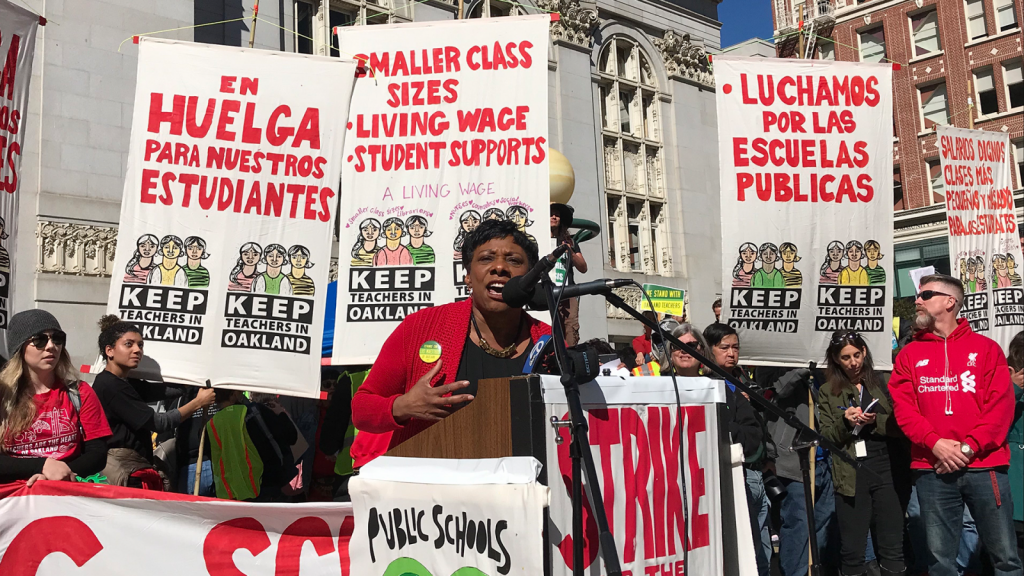What Are Teachers Associations And How Much Power Do They Have?
Teachers, through their unions, have been wielding more and more power, staging walkouts and protests as COVID continues to dictate how we live our lives. But not all teachers fall under union policies and some states don't allow teachers unions to form. There are plenty of teachers out there who continue to put a child’s interest in front of their own. These teachers still want the same protections afforded to those in a union, which is why there are teachers associations.

In today’s educational landscape that the focus is leaning more heavily on who’s running the show instead of who the show is meant for. Teachers, through their unions, have been wielding more and more power, staging walkouts and protests as COVID continues to dictate how we live our lives. But not all teachers fall under union policies and some states don’t allow teachers unions to form. There are plenty of teachers out there who continue to put a child’s interest in front of their own. These teachers still want the same protections afforded to those in a union, which is why there are teachers associations.
WHAT ARE TEACHERS ASSOCIATIONS?
First and foremost, teacher associations are nonunionized. Based on a 2018 Supreme Court ruling, teachers can no longer be forced to join a teacher’s union, something that many were required to do as a condition of employment in the past. No longer do teachers have to pay monthly fees to a many times, political agenda which they do not support.
Now that teachers have been given back their right to choose whether they want to join a union or not, that becomes the all-important question. Should teachers join a teacher’s association? If so, what sort of benefits does a teacher’s association provide?
THE BENEFITS
A good teacher’s association will offer its members a number of benefits. These can be legal in nature all the way down to discounts on items. Here are a few:
Legal Protection – If your educational duties somehow place you in harm’s way causing legal ramifications, a teachers association can ensure your legal protection. They will give you access to legal counsel from the start and will also cover legal costs.
Professional Resources – Member forums are a great place to obtain useful information and teachers associations can provide these. They also offer other professional resources that teachers will have access to. These can help teachers navigate classroom problems or workplace difficulties. They also allow teachers to stay current with teaching trends.
Liability Insurance – You may not be aware of this, but a school district’s liability insurance covers the district, not the individual teacher. Liability insurance through a teacher’s association will cover the individual teacher should an unfortunate issue arise from your educational duties, and you are required to pay restitution. Having your own personal liability insurance is always a wise move.
Advocacy – It is always good to have a strong voice in your corner. A solid teachers association can be that strong voice. They will speak up loudly for the members they represent, and they will draw firm attention to teacher-specific needs.
Discounts – Who doesn’t love a good discount? We are sure teachers do so they can take advantage of that summer downtime. A teachers association can provide such things. They often are given an opportunity for discount health insurance, auto insurance, and retail purchases. They also will see a number of discounts for entertainment venues.
TEACHER’S ASSOCIATIONS ACROSS THE U.S.
Teacher’s associations are organizations that are seen nationally and regionally. They can also be offered as discipline-specific associations as well. One of the most respected nonunion associations is the Association of American Educators. They are the largest teacher’s association in the U.S. and offer members $2 million individual liability insurance coverage. They also offer teacher scholarships and classroom grants among the many other benefits.
Some of the other well-known teacher’s associations include: Christian Educators Association International, Associated Professional Educators of Louisiana, Northwest Professional Educators, Arkansas State Teachers Association, and the Professional Association of Colorado Educators.
WHAT A TEACHER’S ASSOCIATION IS NOT SUPPOSED TO DO
While teacher’s associations are a great alternative to unions, they aren’t the catch-all. Although teacher’s associations routinely advocate on behalf of their teachers, they do not hold collective bargaining rights. Therefore, teacher’s associations are unable to negotiate salaries for their members or organize a strike. But to be clear, a teacher does not need a union to be able to negotiate salary, they are really only meant to be an aid.
Because of this more limited scope, associations dues are much lower than that of unions.
One more thing a teacher’s association is not supposed to do, is support any particular political agenda. They are not supposed to take a political stance, nor do are they supposed to support political campaigns. Since a teachers association’s purpose is to support teachers in development and success, issues outside this realm should not concern them.

However, in practice teachers associations tend to ignore the idea that they aren’t supposed to get involved in politics. Visit any teachers association website and you’ll see them involving themselves in a whole host of political issues, and ralling their members to support those causes. For example the Texas State Teachers Association has an entire section on their website dedicated to “Legislative Action” and is currently heavily involved in helping the Democratic party push their narrative on the voting rights issue, something which clearly has nothing at all to do with teachers.
So while in theory teachers associations are supposed to be a lighter alternative to unions, in practice over the years they’ve slowly begun to morph into a carbon copy of their union counterparts. Modern teachers associations are little more than a light version of a union.



